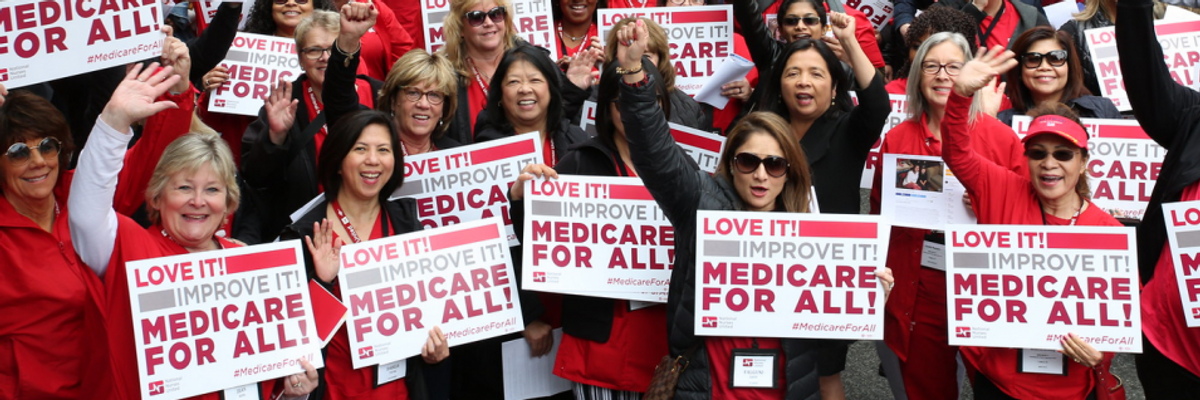As a pediatrician, I see every day how my patients and their families are failed by our current healthcare system. What I need my fellow Americans to understand is this: when my patients struggle, it's not because they're unfortunate. It's because the system is unjust.
I've cared for diabetic teenagers who've rationed insulin and test strips because their family doesn't have enough money to buy prescriptions, supplies, and groceries. I've cared for college students who are dropping out of school because their family needs someone to care for a grandparent, and the costs of long-term care and college tuition are just too much to bear. I've cared for mothers and newborns who lost their insurance coverage simply because they moved across state lines to be closer to family.
Sometimes grandparents bring my patients to clinic, and I see how they tape up their eyeglasses because Medicare does not cover vision and they can't afford new frames until the next Social Security check comes in. Many of my patients with complex pre-existing conditions, and supposedly "good" insurance from their parents' employment, face ridiculous obstacle courses from insurance companies just to get basic care like imaging or consultations with therapists.
There's a big difference between what's unfortunate and what's unjust, especially in health care. It's terribly unfortunate to be diagnosed with cancer. It is unjust that getting diagnosed with cancer often means losing your job because you're too sick to work, and losing the health insurance that came with that job. Insurance you paid into with every paycheck and that was supposed to be there for you if the worst happened.
"Thousands of doctors like me strongly support Medicare for All. We are joining millions of people who understand the difference between what's unfortunate and what's unjust."
It's unfortunate to be diagnosed with diabetes as a teenager. It's unjust that many diabetic patients ration insulin while Big Pharma corporations make exorbitant profits off a drug that's almost a hundred years old. It's terribly unfortunate to develop Alzheimer's or multiple sclerosis. It's unjust that insurance companies bill families thousands and thousands of dollars a month for the most basic long-term care, all while the workers providing that care are paid poverty wages.
Right now, our unjust health care system helps you only after it deems you worthy or deserving of medical services. People's eligibility for Medicaid or for assistance with purchasing private insurance largely depends on what state they live in and how much they earn. State governments often make enrollment difficult in order to deter people from enrolling in coverage. One mistake on a form or a misunderstood deadline can cause patients to lose coverage. The financial hurdles of premiums, deductibles, and co-pays are unjust obstacles for millions of us.
These hurdles are not labyrinths of misfortune. They are injustices, particularly cumbersome for low-income families and people of color who unsurprisingly make up 59 percent of the uninsured.
We don't have to live like this.
Thousands of doctors like me strongly support Medicare for All. We are joining millions of people who understand the difference between what's unfortunate and what's unjust. Right now, patients who survive cancer are often left struggling with financial ruin. Diabetics are torn between paying for insulin or their rent. Medicare for All ends those injustices by significantly reducing the prices of drugs like chemotherapy and insulin. Medicare for All provides patients with reliable, comprehensive coverage regardless of their employment status.
"There's a big difference between what's unfortunate and what's unjust, especially in health care."
Continuous, reliable coverage is particularly important for people of color, who are becoming the majority of the U.S. population and bear undue burdens of illness and disparities. The Medicare for All legislation in Congress will address inequities in health care, including by stabilizing funding for all hospitals and clinics.
Medicare for All will cover vision care, so that the grandparents in my clinic can get new glasses. Medicare for All will be portable, so families can move from state to state or job to job without having to worry about insurance coverage. Medicare for All will cover long-term services and supports, so seniors and people with disabilities can live with dignity at home and in their communities.
But to build Medicare for All it's going to take all of us. Together, we can fight Big Pharma, the insurance industry, and all their lobbyists. Together, we will create a Medicare for All system that will deliver real health justice for every person in America, no matter what you earn, where you live, or what you look like.
